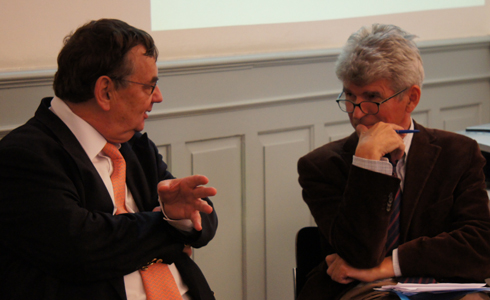
Deep down Luzius Wasescha is a multilateralist. Until July 2012, Wasescha led the Swiss delegation to the WTO in Geneva, where he was widely respected for his negotiation skills. Ultimately, he is probably not happy about the Doha Round being deadlocked and would prefer a multilateral trade agreement to the proliferation of bilateral accords that have been concluded recently.
Yet, in part, Wasescha is also responsible for the stalemate at the WTO – in his capacity as Switzerland’s representative. As the former speaker of the G10, a group of agriculturally protectionist countries, he fought against a substantive reduction in tariffs on agricultural imports. Those tariffs are part of the conflict at the WTO between developed and developing countries that is holding up the Doha Round.
Swiss-Japanese FTA already a success
Rather than waiting for an unlikely multilateral breakthrough, trade diplomats in many countries have strengthened their efforts to conclude bilateral agreements, in order to reap at least some of the promised trade benefits. And again, Wasescha’s negotiation skills were called for.
Due to domestic pressure from the agricultural sector, it would be impossible for Switzerland to conclude a free trade agreement (FTA) with a big food exporter. Recently, for example, negotiations aimed at liberalizing trade in agricultural products between Switzerland and the EU had to be stopped, after the agricultural lobby flexed its muscles. In the case of China, with which Switzerland is currently negotiating an FTA, agriculture is again a stumbling block.
With Japan, however, things were different. The two countries managed to conclude a Free Trade and Economic Partnership Agreement (FTEPA) three years ago. Already, the Swiss-Japanese FTEPA can be called a success, say Patrick Ziltener and Georg Blind from the University of Zurich, presenting the results of an empirical study.
Japan was already the third East Asian country after Singapore and South Korea to sign an FTA with Switzerland. For Japan, however, which has only adopted the bilateralist route more recently, the FTA with Switzerland was the first it had signed with a developed country. Luzius Wasescha, who led the FTEPA negotiations on the Swiss side, admits that everyone was surprised when it actually happened, as both countries waited for the other side to take the initiative.
Unlikely free trade advocates
Whereas for Switzerland the case was clear, it was less obvious to the Japanese government why they should negotiate an agreement with such a small economy. But there were two strong advocate groups, according to Georg Blind, Patrick Ziltener and their co-authors. The first group regarded Switzerland as an entry point into the much bigger European market, as Switzerland is connected to the EU with a free trade agreement.
The second group, surprisingly, was the Japanese Ministry of Agriculture and its constituents. Realizing that Swiss-Japanese trade in agricultural products is small and could be liberalized in a limited way, they saw the agreement as a cheap opportunity to give in to external pressure and temper their reputation as arch-protectionists.
Japan and Switzerland were well acquainted with each from their cooperation in the G10 group, says Luzius Wasescha. Mutual trust gained from this experience certainly helped make the negotiations a success. In addition, the two countries advocate the same international trade policies: reducing trade barriers on industrial products as quickly as possible, while protecting agricultural production as long as possible. Australia, however, provides us with the counter-example: a Member of the Cairns Group, the G10’s adversary at the WTO, Australia started free trade negotiations with Japan at the same time as Switzerland. But to this day, no agreement has been concluded.
Japan has moved on and is now negotiating with the EU. Tokyo hopes to benefit from the experience gained from the negotiations with Switzerland to get a better deal with the EU. But, should the EU carry the day, Wasescha hopes that Switzerland will be able to improve the FTEPA with Japan.
The same hopes have not been realized in the case of South Korea, however, where the EU negotiated more effectively than Switzerland. The South Korean government now says that Switzerland is too small and does not merit a revision of the agreement.
Bilateralism for how much longer?
And on goes the logic of bilateral trade politics… but for how long? “In East Asia,” according to Patrick Ziltener, “trade bilateralism will work less and less, in an era of regional supply networks.” An alternative to this noodle bowl of agreements is provided by Asia-Pacific Economic Cooperation (APEC). APEC is supposed to be an open framework but when Switzerland asked whether they could join, they rejected, recalls Wasescha.
“In the 1990s, there was this Asia-Pacific regional trade hype”, remembers Ziltener, “but not much came out of it. Now, the US tries to negotiate a Trans-Pacific Partnership (TPP) agreement but that is not going to work either.” Wasescha agrees: “One might have the impression that some would like to use the TPP as a tool to contain China. […] Unless the US changes the program, the TPP is not going to work”.
In the end, the bilateralist and regionalist approaches might come to a standstill, too. What is going to happen then? Luzius Wasescha, the multilateralist, believes that governments will return to the WTO table and finally get their act together.
Ambassador Luzius Wasescha, Dr Patrick Ziltener and Georg Blind spoke at JapanGate II, a symposium organized by the Swiss-Japanese Chamber of Commerce (SJCC) Alumni Organisation in Zurich, 27 September 2012.

